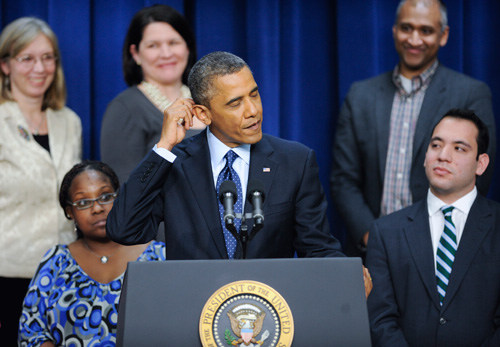|
 |
|
FISCAL CLIFF FINALE?: U.S. President Barack Obama pauses during a speech on the fiscal cliff at the White House on December 31, 2012 (ZHANG JUN) |

As if watching a replay of the fight over the U.S. national debt ceiling in 2011, the crisis billed as the "fiscal cliff" ended up with a last-minute compromise between the two major political parties of the United States. The House and Senate approved the legislation respectively with votes of 257-167 and 89-8. On January 3, President Barack Obama signed the resulting piece of legislation called the American Taxpayer Relief Act of 2012, a bill that will undo or delay much of the fiscal cliff.
The hovering risks of potential fallout from a failure to compromise had put global financial markets on edge for two months. After the danger temporarily subsided, the global stock market and risky assets began to climb. However, the agreement between the two parties revealed deeper problems in U.S. political and economic systems.
At first glance, the 11th-hour agreement shows the relative maturity of the U.S. political system. In spite of the furious fight between the two parties, they reached consensus in the nick of time. The legislation left some major issues unsettled, however, especially the U.S. national debt ceiling dilemma, which needs to be solved immediately.
As the U.S. national debt officially reached the $16.4-trillion limit, the U.S. Department of the Treasury's "special arrangement" is the only thing preventing the awkward event of a debt default. But if Congress cannot approve a bill to create a new top limit of national debt in late February or early March, even the Treasury Department may not come to the rescue. By then, the federal government could be faced with a shutdown. The two major parties could then predictably engage in yet another round of intense bargaining, throwing the financial markets for a loop once again. In the end, it is almost certain that the country will find a way to increase the debt ceiling.
From a longer-term perspective, the legislation doesn't clear away all of the fiscal obstacles facing the United States. On the contrary, it might lead to a new vicious cycle of Uncle Sam's habit of quenching his thirst with poison. Public debt of many developed countries has climbed to a level not seen since the end of World War II. Like Greece, Italy, Portugal, Ireland and Japan, the United States also has a total debt exceeding 100 percent of its GDP. The U.S. fiscal pattern has long been one of borrowing new debt to pay off old debt, and there seems to be no possibility of cutting off fiscal deficit or national debt in the foreseeable future. Many critics have even likened the U.S. fiscal situation to a pyramid financing Ponzi scheme.
While clearly over-drafting its national strength, the United States has continued to receive overseas capital inflow rather than suffering from the kind of capital flight taking place in Greece and Portugal. For most of last year the U.S. dollar remained strong, owing to the United States' status as the only super power in the world as well as the country's currency hegemony built on political and military hegemony.
The dollar has benefited from a "safe haven effect," in which global capital turns to the dollar whenever an international crisis emerges. This explains how Uncle Sam is able to raise its debt limit repeatedly and use additionally printed paper money in exchange for the real fortune of other countries. To sustain its hegemony, the United States would rather pay astronomical military costs year after year. Just as the fiscal cliff agreement was taking shape, Obama signed another bill authorizing a $633-billion national defense budget—a sharp illustration of the country's priorities.
Its huge military expenses not only serve as the main reason for the country's enormous deficit and national debt, but also add an unbearable burden to the U.S. economy because of its nonproductive character. The expansion of the deficit and national debt will be difficult to manage until its inevitable end. The United States can trick the world into paying off its domestic bill because of the international monetary system's long tradition of being based on the dollar's hegemony. But that system cannot last forever.
Some U.S. political elites have realized the danger of the current situation. However, a powerful interest group has developed inside and outside the United States for decades, abusing the superpower's military strength. It continues trying to get the United States entangled in foreign conflicts and recklessly ignores the consequences for the country's national strength.
The interest group is so powerful that the Republican Party works tirelessly to protect military spending with the excuse of "balancing the budget," and many Tea Party members are engaged in high-income industries related to the country's military expenses while calling for tax reduction and fiscal balance. Moreover, many opposition forces in different countries that are part of the interest group expect U.S. military intervention or involvement in their countries against their political targets. The group continually lobbies powerful political figures in the United States, seeking great influence over the U.S. Government's decisions. The conflict in Libya, the Syrian crisis and calls for arms sales to Taiwan in the National Defense Authorization Act for Fiscal Year 2013 have shown that even wise political elites are unable to draw back the excessive influence of the group.
Meanwhile, the United States is undergoing major changes in its demographic structure, further enlarging the country's systemic risk. The fiscal cliff agreement may have demonstrated the country's relatively mature political system, in which opposing parties can make compromises in spite of differences. However, the declining percentage of Caucasians in the U.S. population could radically reshape the political makeup of the United States in the decades ahead. This great change has already had the effect of helping usher Obama into the White House twice.
In his first presidential election, Obama won the support of only 43 percent of white voters, but took 96 percent African-American and two thirds of Hispanic votes. In his second-term election, the vote result showed a clearer dividing line between races. When the demographic map of the United States further transforms, will there still be only two parties involved in major disputes? And will they still be able to reach consensus instead of falling into turmoil? History will give the final conclusion. But while Americans wish for God's blessing upon the United States, the country will not be immune to the cyclical nature of history.
The author is a researcher with the Chinese Academy of International Trade and Economic Cooperation
Email us at: yanwei@bjreview.com | 